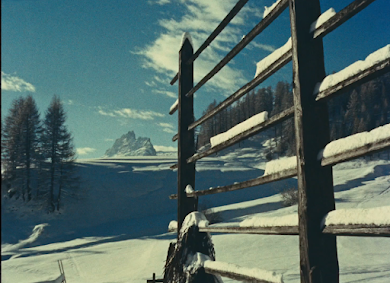In Ferroni’s first shot the camera tilts up from golden fields and bare trees to catch a glimpse of the white-capped Alps, picturesquely freezing the moment when autumn is coming to a close and the fourth season finally beckons. He is not merely content to note that transition, however, with the narrator lingering over a frozen waterfall and bundled men heading out to gather firewood, but bring it to life. In the middle of the night, two children, a boy and a girl, and their predictably lovable St. Bernard, are drawn out of the house to find snowflakes falling from the sky, filmed to look like pixie dust, equating the season’s first snow with magic. It might well be a rebirth too, as a crucifix nailed to the back of a wooden road sign denotes, lingered over by the camera amid sheets of snow, bright and white the next morning. Then, from over a white-capped hill, comes a skier bearing the Olympic torch, a hero’s entrance if there was one, melding the idea of the arrival of winter with the start of the Winter Games. And it was this image that made me realize I view the start of the Winter Olympics as akin to Christmas morning. (Or used to anyway.)
If it was the best opening passage to an Olympics documentary I have so far seen, the rest of “White Vertigo,” alas, is not quite to the same level, though not entirely expendable either. True, in recounting full events, like the men’s 50KM cross-country skiing race, Ferroni and his editor fail to assemble a properly dramatic package, all a bit too brisk and repetitive in its imagery, while early attempts at cross-cutting between disparate events elicits distraction rather than lyrical abstraction. But Ferroni nevertheless extracts poetry in the Olympic moment. A few images of flags whipping in the wind, as well competitors and officials and spectators alike struggling up the mountain, convey the difficult conditions while his wide shots of the ski jumping competition illuminate the majesty and danger more than modern television, which resorts to the same shots over and over, unintentionally rendering tedium.
It’s not just Ferroni’s framing in these moments, though, but an engaging musical score by Angelo Francesco Lavagnino that delightfully adjusts for different sports. Strings and a harp instill the ski jumping with a sense of fantastical daring just as the jazz over hockey makes it seem like Peanuts characters on ice and the choral additions to the score during skiing events lend them a storybook feel, especially when cross-country skiers take their races into the woods. The movie’s photography proves distinct too. Modern HD might make for sharper images of Winter Olympics broadcasts than a Philco television set, but modern HD is no match for “White Vertigo’s” old school Eastmancolor which imbues all these images with the look and feel of vintage travel posters, lending these feats of strengths the radiance they deserve. Indeed, when the camera briefly catches the shadow of a figure skater on the ice of the outdoor rink, it’s like one of those Sonja Henie movies has suddenly stepped through the door on Dorothy’s farm in Kansas and out into the land of Oz.





No comments:
Post a Comment